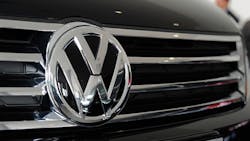FRANKFURT, Germany — Shares in Volkswagen tumbled on the Frankfurt stock exchange on Tuesday amid new accusations in the ever-widening emissions cheating scandal, but the German auto giant adamantly denied the new charges.
VW shares skidded 5.1% at the start of trade to an intraday low of 107.00 euros ($117.35) after U.S. regulators had accused it late Monday of fitting illegal “defeat devices” into its larger 3.0 liter diesel engines.
In an affair that has rocked the automobile sector since it broke in September, the carmaker has already admitted using the software, which skews the results of pollution tests, in smaller 2.0 liter diesels equipped in some 11 million cars worldwide.
But the Environmental Protection Agency said late Monday it had discovered in its investigation that various six-cylinder 3.0 liter diesel VW Touareg, Porsche Cayenne and Audis had also been rigged with the software.
“We have clear evidence of these additional violations,” said Cynthia Giles, an official with the EPA’s Enforcement and Compliance Assurance office. “VW has once again failed its obligation to comply with the law that protects clean air for all Americans.”
VW Denies New Allegations
VW denied the new charges, saying in a statement that, “Volkswagen AG wishes to emphasize that no software has been installed in the 3-liter V6 diesel power units to alter emissions characteristics in a forbidden manner.
“Volkswagen will cooperate fully with the EPA (to) clarify this matter in its entirety.”
Separately, VW’s luxury sports car brand Porsche, said, “We are surprised to learn this information. Until this notice, all of our information was that the Porsche Cayenne Diesel is fully compliant.”
In terms of image, the scandal is turning into a veritable car crash for a company long seen an emblem of Germany’s industrial might.
Already, CEO Martin Winterkorn, has lost his job and shares of the giant have lost nearly one-third of their value since the scandal erupted. The new U.S. notice of violation, for the larger-engined cars, could weigh on Winterkorn’s replacement, Matthias Mueller, who was elevated from running VW’s Porsche subsidiary. At the time of his promotion, Porsche vehicles were not known to have the defeat devices.
Moreover, the first notice of violation on September 18, which launched the scandal, made clear that from the EPA alone, the company was facing a potential $18 billion in fines, based on the maximum allowed per vehicle and the roughly half-million U.S.-sold cars covered.
There are also a number of owner lawsuits against the company, and it could be hit with fines in other countries and regions as well.
Financial Losses
The new notice covers about 10,000 mostly luxury cars already sold in the United States, and an unknown number still unsold.
But, as with the initial notice, it was possible that the same cars sold elsewhere would be shown to have software defeat devices as well.
After the first accusations in September, Volkswagen publicly admitted that its smaller diesels had the devices, and promised full cooperation in probes by not only U.S. authorities, but also German and European authorities, and some in other countries.
The House of Representatives Energy and Commerce Committee, which has opened a probe into the emissions scandal, said the new allegations meant “it’s time for Volkswagen to fully come clean. … The EPA expanding its investigation prompts questions regarding the prevalence of the emissions cheating and how it went undetected for so long.”
The scandal is clearly taking a toll on Volkswagen’s finances. Last week, the company booked its first quarterly loss in more than 15 years as it set aside 6.7 billion euros ($7.35 billion) to cover the initial costs of the scandal.
Chief financial officer Frank Witter warned of further “considerable financial charges” from the emissions case. It was “far too early to calculate the cost of any legal measures,” he said. “The financial burden will be enormous, but manageable.”
German New Car Sales Up in October, VW Sales Flat in US
In related news, new car registrations in Germany, a key measure of demand, edged higher in October, data showed Tuesday, appearing to shrug off fears the Volkswagen pollution-cheating scandal could weigh on sales in the sector.
A total of 278,400 new cars were registered last month, an increase of 1% compared with the figure for the same month last year, according to data compiled by the automakers’ federation VDA.
That was the highest sales figure for October in 10 years, VDA said.
Taking the ten months to October, new car registrations advanced by 5% to 2.686 million vehicles, the statement continued.
The number of new registrations of diesel-powered cars increased by 6% in the period from January to October, VDA added, calculating that diesel cars accounted for 48%, or nearly half, of the entire new car market in Germany.
Meanwhile, Volkswagen sales in the U.S. market appeared to take a hit last month from the ongoing scandal, coming in flat amid overall sales that grew about 11.5%.
VW said Tuesday that it had sold 30,387 Volkswagen-brand cars in the United States in October. That was just 0.24% over a year ago, while rivals like General Motors and Ford registered double-digit growth in what proved for U.S. automakers their best month since 2001.
By Simon Morgan
Copyright Agence France-Presse, 2015
About the Author
Agence France-Presse
Copyright Agence France-Presse, 2002-2025. AFP text, photos, graphics and logos shall not be reproduced, published, broadcast, rewritten for broadcast or publication or redistributed directly or indirectly in any medium. AFP shall not be held liable for any delays, inaccuracies, errors or omissions in any AFP content, or for any actions taken in consequence.
